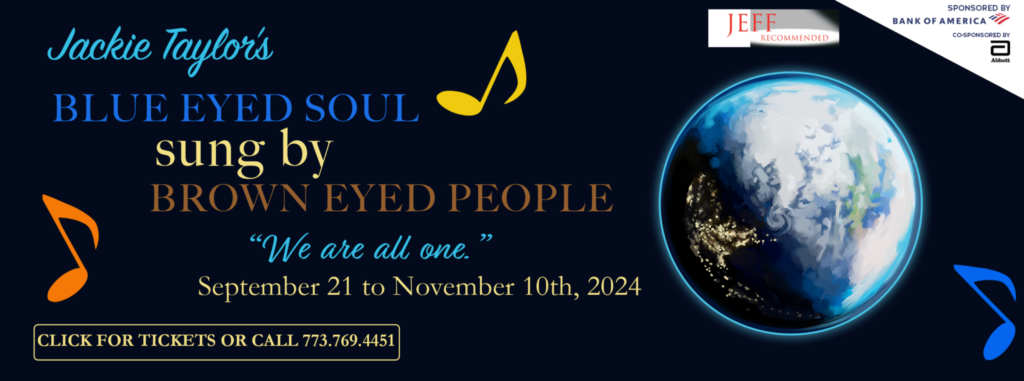
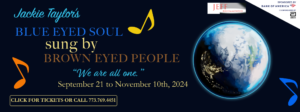 *** Jackie Taylor’s “Blue Eyed Soul Sung by Brown Eyed People” features singers with incredible voices, each one better than the next. This is a show about soulful popular songs composed by white songwriters or popularized by white recording artists, now being sung by an all-black cast. And the choice of music is great! Today’s entertainers do an incredible job making each of these songs their own. I also liked hearing all of the information about the origin of the various songs and where they were once performed. As a whole, this production is fun, exciting, and uniquely enjoyable.
*** Jackie Taylor’s “Blue Eyed Soul Sung by Brown Eyed People” features singers with incredible voices, each one better than the next. This is a show about soulful popular songs composed by white songwriters or popularized by white recording artists, now being sung by an all-black cast. And the choice of music is great! Today’s entertainers do an incredible job making each of these songs their own. I also liked hearing all of the information about the origin of the various songs and where they were once performed. As a whole, this production is fun, exciting, and uniquely enjoyable.
The underlying story that binds things together is rather deep. Taylor, who is not only the artistic director and founder of Black Ensemble Theater, has written the book: She has developed an entire mythical venue called the Oracle Theatre, which is located in a non-physical plane above and beyond existence on earth. This is an imaginative dimension where The Essences reside. The Essences are seven different parts of a person’s inner self, all of which define an enlightened human being. They are known as Mind (Vincent Jordan), Intellect (Taryn Welch), Humanity (Tia Jemison), Passion (Britt Edwards), Soul (Direoce Junirs), and Spirit (LaRon Jones). There is also Voice (Rhonda Preston), who coordinates all the other Essences. As their spokesperson and guide, she provides them with a rationale for being. Three people called The Historians are also present. They include Barthalamul (Dennis Dent), Lydaya (Raeven Carroll), and Othello (Trequon Tate). Most importantly, it is Othello who asks the fundamental question of “Why?” or “Why is the program called “Blue Eyed Soul Sung by Brown-Eyed People”?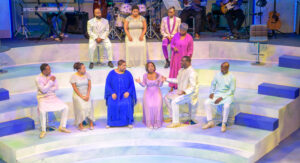
We get the idea pretty early on about what the answer might be. For some, it might appear obvious from the title of the show…. But then again, maybe not! It is the discussion among The Essences which can lead us to a conclusion that we may not have drawn earlier: As Taylor herself puts it in the advance piece, “[The production] is a tribute, a tribute that unites us all as one people.” And the audience gets it: that everybody is really the same underneath the skin—or basically underneath the brown or the blue eyeball. But here’s the issue: How many times must this point be made? The show is almost too preachy, and the dialogue gets tedious. In my opinion, it would have been better to feature additional songs and fewer words. I would have preferred that the audience make the philosophical leap in their heads rather than have the message pounded into us.![]()
The fuss about what the theme might or might not mean subsequently morphs into whether a given song or entertainer “fits the bill” or not. From my perspective, that didn’t matter so much, since popular music often straddles genres. I loved hearing songs such as “I Will Always Love You”, “It’s Not Unusual”, and “When I Need You”: all of which have to do with love. But how much does each of them have to do with soul music? Or does the inclusion of a song have to do with the soul of the person singing it? So what is the definition of soul in this program? This became more problematic to me as time wore on. For example, it was interesting to learn about how country music was not exclusive to white Americans even before Beyoncé adopted it. But why was the country genre included for the purpose of this performance–whereas the two Elvis numbers “Blue Suede Shoes” and “Jailhouse Rock” were dismissed? I would’ve liked to have heard these songs sung all the way through. Perhaps after each, The Voice could have said, “It doesn’t fit the theme.” But was it that they are being considered rock rather than soul? To my mind, once the songs were interrupted, I became confused about the theme itself. Edwards, mimicking Elvis, was singing these with all of her heart and soul in one of the show’s best performances.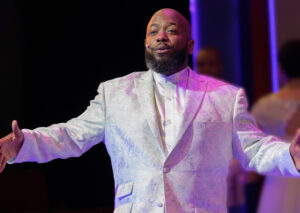
![]()
What I took away from the entire presentation is that music transcends not only a person’s skin tone and personal biography but that divisions between people and music are often arbitrary. No matter who has written these songs or has previously performed them, they are clearly meant to be sung by everybody regardless of race, color, ethnicity, national origin, and the like. Thus, it’s not just the distinction between blue versus brown eyes that’s significant in this program, but this also extends to green eyes, hazel eyes, and all eye colors in between… and all skin tones and backgrounds.
Set and light designer Denise Karczewski has done a great job setting the mood for this production. I enjoyed seeing lots of blue lighting throughout much of the show, particularly the big convex “eyeball” at the top of the stage, usually lit up in blue. The oblong shapes along the theatre walls are neatly outlined in LEDs. It’s a nice touch to see the round stage floor with blue lighting at the beginning of the performance. In fact, the set consists of a series of concentric circles with seats on the various levels for the singers, most of whom descend steps and perform at the bottom of the stage. Projection design by DJ Douglas largely consists of displaying old photographs from the original bands and recording artists. As for costumes, I particularly liked Preston’s magenta gown and Jennison’s deep blue gown with chiffon sleeves that worked very well when she sang “I Want to Fly Like an Eagle.” Instrumentalists include musical director, drummer, and arranger Robert Reddrick, keyboardist Adam Sherrod, guitarist Oscar Brown Jr., and bassist Walter Harrington, all of whom are perched above the stage. As usual, it’s a very loud performance, and I had to wear earplugs. My guest had to remove her hearing aid in order to enjoy herself.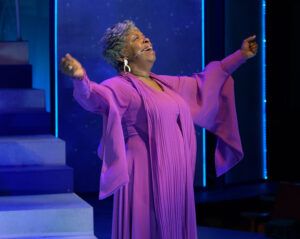
The gist of the story is that songs and music feed one’s soul. We learn that throughout the decades, white and black artists have often have borrowed from each other and that the racial background or the skin color of the composer or performer is far less important than the universality of the art form. While the message of the show is excellent (namely, that “We are all one”), the book needs some tweaking. There is too much banter and too much repetition. Music, however, can take our collective spirit up to the next level and can get us to a place that words can only aspire to. The performance needs to culminate in a more energetic finale and crowd response, as is common at most productions at Black Ensemble.
“Blue Eyed Soul Sung by Brown Eyed People” is playing through November 10, 2024, at Black Ensemble Theater Cultural Center, 4450 N. Clark Street, Chicago.![]()
Tickets: $56.50 – $66.50 (fees included)
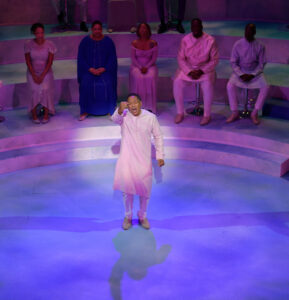 Performance schedule:
Performance schedule:
Saturdays – 3:00 p.m. and 8:00 p.m.
Sundays – 3:00 p.m.
For more information and to purchase tickets, go to https://blackensembletheater.org/ or visit the Box Office at 4450 N. Clark Street, or call 773-769-4451.
Valet parking is available for $13 (cash only).
EDITOR’S NOTE:Jane and I went on Friday, October 4th to watch this production. Turns out, the role of SPIRIT was being performed by Dwight Neal, in place of LaRon Jones and quite an impressive performance it was. I also want to say that Britt Edwards proves a point made many years ago, “Good things DO come in small packages”. This dynamite performer has a voice that will knock your sox off!
This show may not be the best script you will ever witness, BUT the voices and material they sing are a fantastic evening of entertainment!
To see what others are saying, visit www.theatreinchicago.com, go to Review Round-Up and click at “Blue Eyed Soul Sung by Brown Eyed People”.


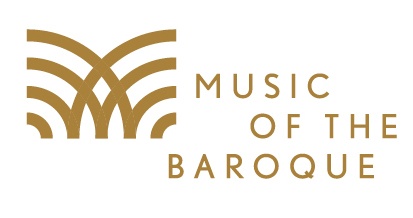

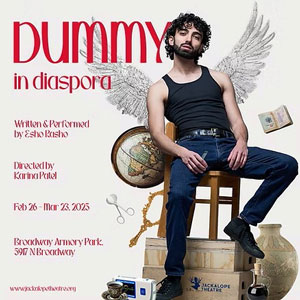
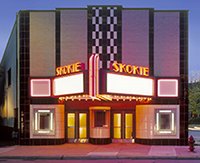
More Stories
“Dummy in Diaspora”
“The Magic School Bus: Lost in the Solar System”
“February House” reviewed by Julia W. Rath